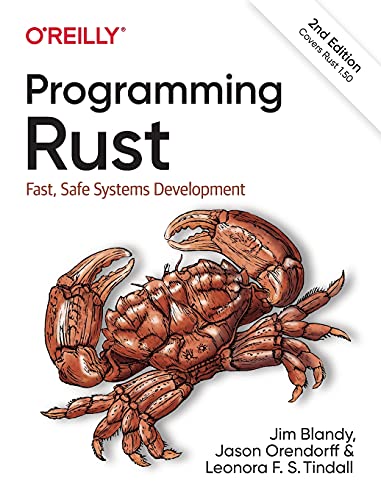
Programming Rust: Fast, Safe Systems Development PDF
736 Pages·2021·6.2367 MB·other
Most books are stored in the elastic cloud where traffic is expensive. For this reason, we have a limit on daily download.
Preview Programming Rust: Fast, Safe Systems Development
Description:
The Rust programming language offers the rare and valuable combination of statically verified memory safety and low-level control. Imagine C++ but without dangling pointers, null pointer dereferences, or buffer overruns, and with a deep library of freely reusable libraries. This practical guide gives systems and application programmers alike a solid understanding of Rust's rules, and shows how to put them to work ensuring their programs are not only efficient, but free of broad classes of common errors. Rust brings the benefits of an expressive modern type system to systems programming. Authors Jim Blandy, Jason Orendorff, and Leonora F.S. Tindall demonstrate how Rust's features put programmers in control over memory consumption and processor use, combining predictable performance with memory safety and trustworthy concurrency. You'll learn: How to write fast, safe, concurrent programs in Rust Rust's rules for managing memory efficiently, including ownership, borrowing, moves, and lifetimes How to design interfaces that fit well into the Rust ecosystem Cargo, Rust's all-purpose tool for building, testing, and managing Rust packages High-level features like traits, generics, closures, and iterators that make Rust productive and flexible
Book description
Systems programming provides the foundation for the world's computation. Developing performance-sensitive code requires a programming language that puts programmers in control of how memory, processor time, and other system resources are used. The Rust systems programming language combines that control with a modern type system that catches broad classes of common mistakes, from memory management errors to interthread data races.
With this practical guide, experienced systems programmers will learn how to successfully bridge the gap between performance and safety using Rust. Jim Blandy, Jason Orendorff, and Leonora Tindall demonstrate how Rust's features put programmers in control over memory consumption and processor use by combining predictable performance with memory safety and trustworthy concurrency.
You'll learn:
• Rust's fundamental data types and the core concepts of ownership and borrowing
• Language basics including error handling, crates and modules, structs, and enums
• How to write flexible, efficient code with traits and generics
• Rust's key power tools: closures, iterators, and asynchronous programming
• Collections, strings and text, input and output, concurrency, macros, unsafe code, and interfacing with foreign functions
Book description
Systems programming provides the foundation for the world's computation. Developing performance-sensitive code requires a programming language that puts programmers in control of how memory, processor time, and other system resources are used. The Rust systems programming language combines that control with a modern type system that catches broad classes of common mistakes, from memory management errors to interthread data races.
With this practical guide, experienced systems programmers will learn how to successfully bridge the gap between performance and safety using Rust. Jim Blandy, Jason Orendorff, and Leonora Tindall demonstrate how Rust's features put programmers in control over memory consumption and processor use by combining predictable performance with memory safety and trustworthy concurrency.
You'll learn:
• Rust's fundamental data types and the core concepts of ownership and borrowing
• Language basics including error handling, crates and modules, structs, and enums
• How to write flexible, efficient code with traits and generics
• Rust's key power tools: closures, iterators, and asynchronous programming
• Collections, strings and text, input and output, concurrency, macros, unsafe code, and interfacing with foreign functions
See more
The list of books you might like
Most books are stored in the elastic cloud where traffic is expensive. For this reason, we have a limit on daily download.
